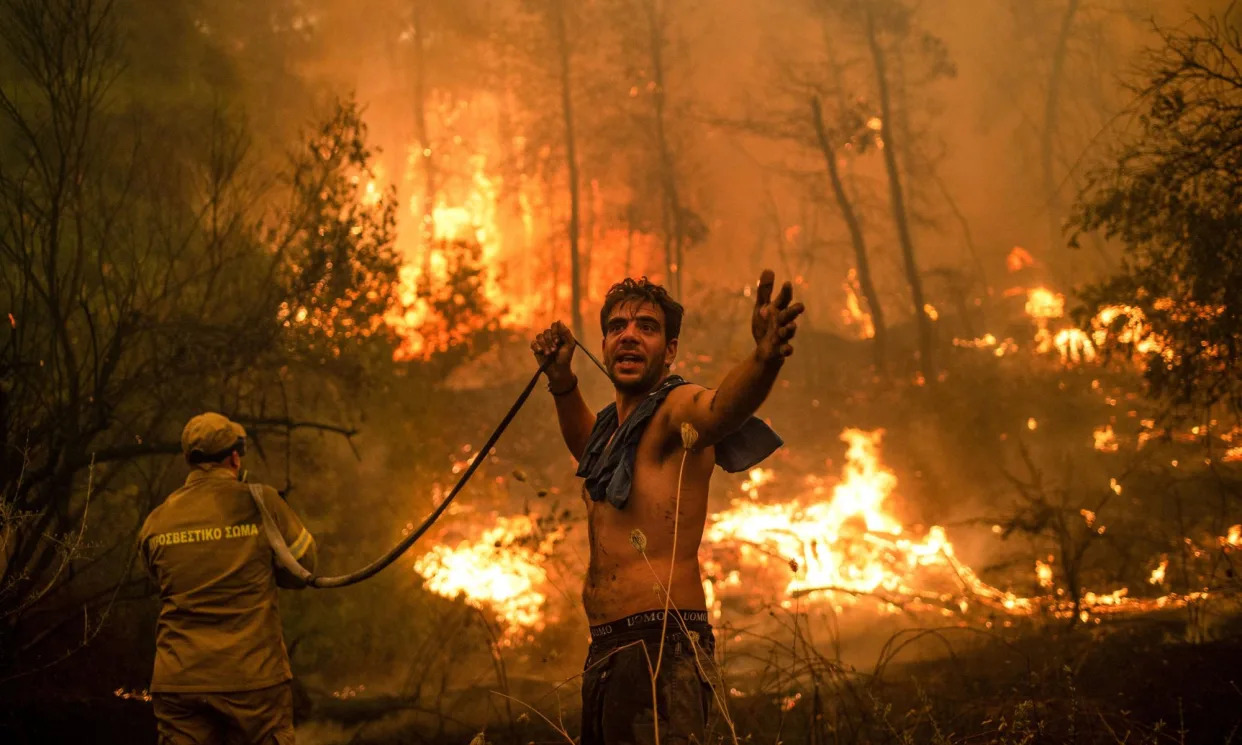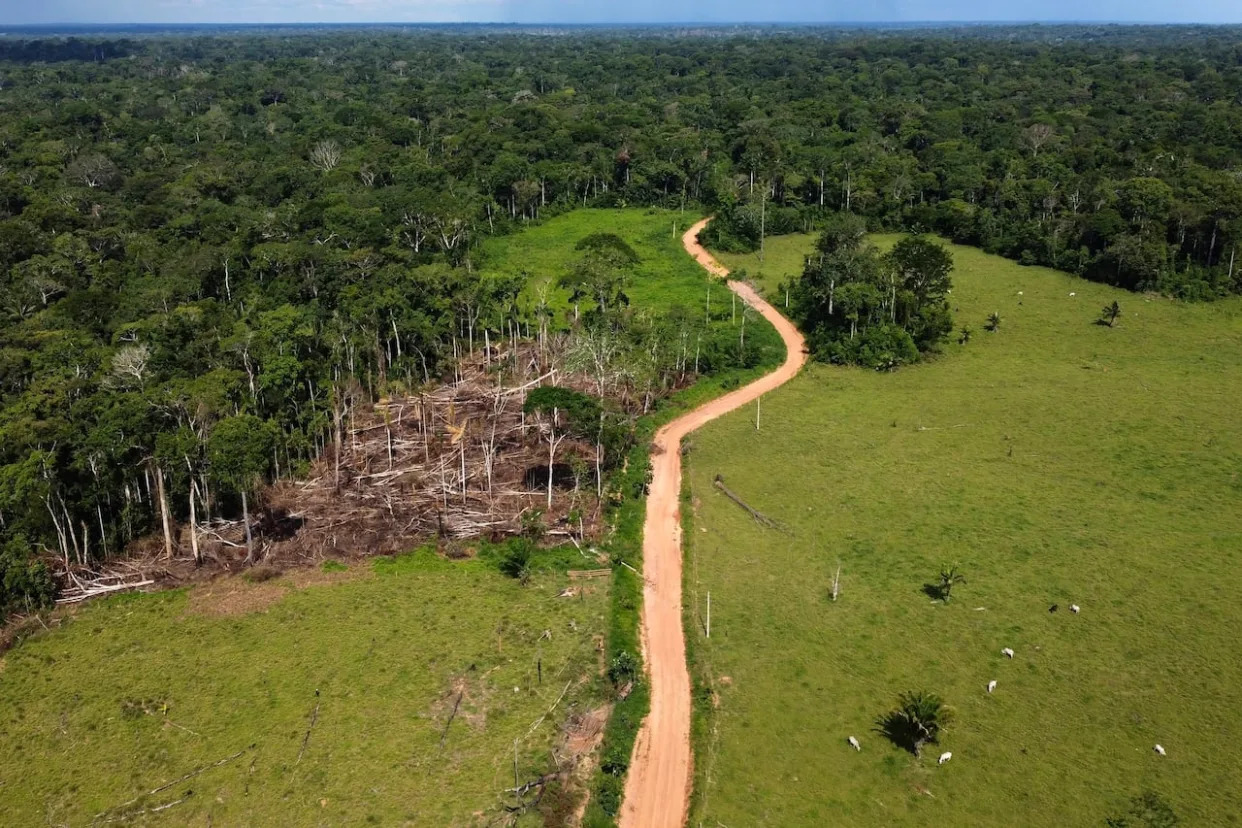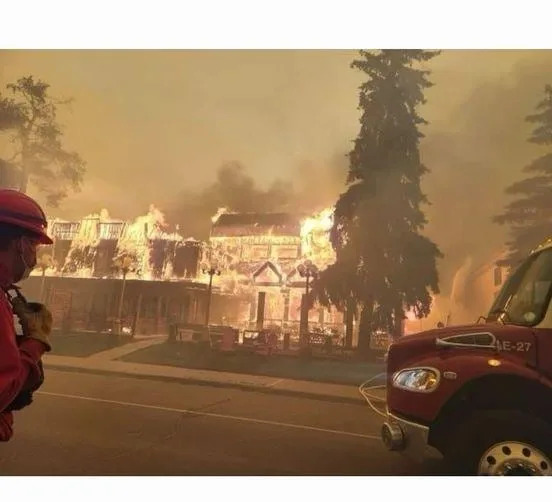Damian Carrington Environment editor
THE GUARDIAN
Tue 8 October 2024

The report said the Earth was entering a ‘critical and unpredictable new phase of the climate crisis’.Photograph: Angelos Tzortzinis/AFP/Getty Images
Many of the Earth’s “vital signs” have hit record extremes, indicating that “the future of humanity hangs in the balance”, a group of the world’s most senior climate experts has said.
More and more scientists are now looking into the possibility of societal collapse, said the report, which assessed 35 vital signs in 2023 and found that 25 were worse than ever recorded, including carbon dioxide levels and human population. This indicates a “critical and unpredictable new phase of the climate crisis”, they said.
The temperature of the Earth’s surface and oceans hit an all-time high, driven by record burning of fossil fuels, the report found. Human population is increasing at the rate of approximately 200,000 people a day and the number of cattle and sheep by 170,000 a day, all adding to record greenhouse gas emissions.
The scientists identified 28 feedback loops, including increasing emissions from melting permafrost, which could help trigger multiple tipping points, such as the collapse of the massive Greenland icecap.
Global heating is driving increasingly deadly extreme weather across the world, they said, including hurricanes in the US and 50C heatwaves in India, with billions of people now exposed to extreme heat.
The scientists said their goal was “to provide clear, evidence-based insights that inspire informed and bold responses from citizens to researchers and world leaders – we just want to act truthfully and tell it like it is”. Decisive, fast action was imperative, they said, to limit human suffering, including slashing fossil fuel burning and methane emissions, cutting overconsumption and waste by the rich, and encouraging a switch towards plant-based foods.
“We’re already in the midst of abrupt climate upheaval, which jeopardises life on Earth like nothing humans have ever seen,” said Prof William Ripple, at Oregon State University (OSU), US, who co-led the group. “Ecological overshoot – taking more than the Earth can safely give – has pushed the planet into climatic conditions more threatening than anything witnessed even by our prehistoric relatives.”
“Climate change has already displaced millions of people, with the potential to displace hundreds of millions or even billions,” he said. “That would likely lead to greater geopolitical instability, possibly even partial societal collapse.”
The assessment, published in the journal Bioscience, said the concentrations of CO2 and methane in the atmosphere were at record levels. Methane is a potent greenhouse gas, 80 times more powerful than CO2 over 20 years, and is emitted by fossil fuel operations, waste dumps, cattle and rice fields. “The growth rate of methane emissions has been accelerating, which is extremely troubling,” said Dr Christopher Wolf, formerly at OSU and who co-led the team.Interactive
While wind and solar energy grew by 15% in 2023, the researchers said, coal, oil and gas still dominated. They said there was “stiff resistance from those benefiting financially from the current fossil-fuel based system”.
The report included the results of a Guardian survey of hundreds of senior climate experts in May, which found only 6% believed that the internationally agreed limit of 1.5C would be achieved. “The fact is that avoiding every tenth of a degree of warming is critically important,” the researchers said. “Each tenth places an extra 100 million people into unprecedented hot average temperatures.”
The researchers said global heating was part of a wider crisis, which included pollution, the destruction of nature and rising economic inequality: “Climate change is a glaring symptom of a deeper systemic issue: ecological overshoot, [which] is an inherently unstable state that cannot persist indefinitely. As the risk of Earth’s climate system switching to a catastrophic state rises, more and more scientists have begun to research the possibility of societal collapse. Even in the absence of global collapse, climate change could cause many millions of additional deaths by 2050. We need bold, transformative change.”Interactive
Among the policies the scientists recommend for rapid adoption are gradually reducing the human population through empowering education and rights for girls and women, protecting restoring, or rewilding ecosystems, and integrating climate change education into global curriculums to boost awareness and action.
The assessment concludes: “Only through decisive action can we safeguard the natural world, avert profound human suffering, and ensure that future generations inherit the livable world they deserve. The future of humanity hangs in the balance.”
The world’s nations will meet at the UN’s Cop29 climate summit in Azerbaijan in November. “It’s imperative that huge progress is made,” Ripple said.
Scientists recently checked up on Earth's 'vital signs.' So how are we doing?
Tue 8 October 2024

The report said the Earth was entering a ‘critical and unpredictable new phase of the climate crisis’.Photograph: Angelos Tzortzinis/AFP/Getty Images
Many of the Earth’s “vital signs” have hit record extremes, indicating that “the future of humanity hangs in the balance”, a group of the world’s most senior climate experts has said.
More and more scientists are now looking into the possibility of societal collapse, said the report, which assessed 35 vital signs in 2023 and found that 25 were worse than ever recorded, including carbon dioxide levels and human population. This indicates a “critical and unpredictable new phase of the climate crisis”, they said.
The temperature of the Earth’s surface and oceans hit an all-time high, driven by record burning of fossil fuels, the report found. Human population is increasing at the rate of approximately 200,000 people a day and the number of cattle and sheep by 170,000 a day, all adding to record greenhouse gas emissions.
The scientists identified 28 feedback loops, including increasing emissions from melting permafrost, which could help trigger multiple tipping points, such as the collapse of the massive Greenland icecap.
Global heating is driving increasingly deadly extreme weather across the world, they said, including hurricanes in the US and 50C heatwaves in India, with billions of people now exposed to extreme heat.
The scientists said their goal was “to provide clear, evidence-based insights that inspire informed and bold responses from citizens to researchers and world leaders – we just want to act truthfully and tell it like it is”. Decisive, fast action was imperative, they said, to limit human suffering, including slashing fossil fuel burning and methane emissions, cutting overconsumption and waste by the rich, and encouraging a switch towards plant-based foods.
“We’re already in the midst of abrupt climate upheaval, which jeopardises life on Earth like nothing humans have ever seen,” said Prof William Ripple, at Oregon State University (OSU), US, who co-led the group. “Ecological overshoot – taking more than the Earth can safely give – has pushed the planet into climatic conditions more threatening than anything witnessed even by our prehistoric relatives.”
“Climate change has already displaced millions of people, with the potential to displace hundreds of millions or even billions,” he said. “That would likely lead to greater geopolitical instability, possibly even partial societal collapse.”
The assessment, published in the journal Bioscience, said the concentrations of CO2 and methane in the atmosphere were at record levels. Methane is a potent greenhouse gas, 80 times more powerful than CO2 over 20 years, and is emitted by fossil fuel operations, waste dumps, cattle and rice fields. “The growth rate of methane emissions has been accelerating, which is extremely troubling,” said Dr Christopher Wolf, formerly at OSU and who co-led the team.Interactive
While wind and solar energy grew by 15% in 2023, the researchers said, coal, oil and gas still dominated. They said there was “stiff resistance from those benefiting financially from the current fossil-fuel based system”.
The report included the results of a Guardian survey of hundreds of senior climate experts in May, which found only 6% believed that the internationally agreed limit of 1.5C would be achieved. “The fact is that avoiding every tenth of a degree of warming is critically important,” the researchers said. “Each tenth places an extra 100 million people into unprecedented hot average temperatures.”
The researchers said global heating was part of a wider crisis, which included pollution, the destruction of nature and rising economic inequality: “Climate change is a glaring symptom of a deeper systemic issue: ecological overshoot, [which] is an inherently unstable state that cannot persist indefinitely. As the risk of Earth’s climate system switching to a catastrophic state rises, more and more scientists have begun to research the possibility of societal collapse. Even in the absence of global collapse, climate change could cause many millions of additional deaths by 2050. We need bold, transformative change.”Interactive
Among the policies the scientists recommend for rapid adoption are gradually reducing the human population through empowering education and rights for girls and women, protecting restoring, or rewilding ecosystems, and integrating climate change education into global curriculums to boost awareness and action.
The assessment concludes: “Only through decisive action can we safeguard the natural world, avert profound human suffering, and ensure that future generations inherit the livable world they deserve. The future of humanity hangs in the balance.”
The world’s nations will meet at the UN’s Cop29 climate summit in Azerbaijan in November. “It’s imperative that huge progress is made,” Ripple said.
Scientists recently checked up on Earth's 'vital signs.' So how are we doing?
CBC
Tue 8 October 2024

Cows roam an area of the Amazon rainforest that's been recently deforested in Brazil. In recent years, the rate of deforestation has declined, which the lead author of a new report that checks up on Earth's 'vital signs' attributes to new conservationist leadership in Brazil. (Eraldo Peres/Associated Press - image credit)
Scientists have given the planet a check-up — and all is not well.
A major new report on what the authors describe as the world's "vital signs," published Tuesday in the journal BioScience, presents a grim picture of where the planet is headed.
The assessment was prepared by some of the world's top climate scientists and builds on a previous analysis backed by more than 15,000 scientists.
Entitled "The 2024 state of the climate report: Perilous times," the assessment found that 25 of the 35 of the measurements used to track the planet's climate risk, from ocean temperatures to tree cover loss, are at record levels.
These measures look at both how humans are changing the planet, and how the planet is responding.
"We are on the brink of an irreversible climate disaster," the authors wrote. "This is a global emergency beyond any doubt."
At the same time, the report also found some surprising signs of progress that experts say point to a path forward. And that's where we'll start.
Some environmental progress
Two charts in the report show signs of environmental progress.
The first looked at how much of the Amazon rainforest has been lost every year. In recent years, the rate of deforestation has declined.
William Ripple, lead author and professor at Oregon State University, calls the Amazon development "really important good news," which he attributes to new conservationist leadership in Brazil.
The rainforest stores an estimated 123 billion tonnes of carbon, according to the U.S. National Oceanic and Atmospheric Administration, roughly equivalent to four years of global emissions if it were to be released as CO2.
The other chart looks at how much energy consumption can be attributed to renewable energy.
The production of renewables has surged, as the chart shows — although the amount of oil, coal and gas also continues to climb. Climate change is driven primarily by the burning of fossil fuels.
"Solar and wind energy are increasing dramatically," Ripple said. "It's still many times lower than fossil fuel, but the trend is deep and upward — and that is promising."
Emissions still climbing
Overall, however, we are emitting more greenhouse gases than ever, on both a global and individual level.
Prof. Sarah Burch, executive director of the Waterloo Climate Institute, says she sees a glimmer of hope in the face of these numbers.
Burch said even though fossil-fuel consumption hasn't levelled off or declined, it is slowing down — and ultimately that could lead to a more clear shift in how we produce energy.
"That's just how things change," explained Burch, who was not involved with the report.
She warns that this doesn't mean we shouldn't be "more ambitious, more creative and more honest about our progress. But we are making progress."
Climate-related disasters
These next charts from the report illustrate how devastating climate-related disasters have been.
Wildfires and floods are on the rise around the world, and the planet is experiencing more and more days of extreme heat.

The Maligne Lodge hotel is one of the structures that burned in Jasper, Alta., after a wildfire reached the townsite Wednesday evening.
The Maligne Lodge hotel is one of the structures that burned in Jasper, Alta., after a wildfire reached the townsite this July, resulting in $880 million in insured damages. Given the scale of fires in 2023, this year's wildfire season wasn't quite as bad, but it was still quietly devastating. (Name withheld)
"We're having these heat waves and floods and hurricanes and they're becoming more frequent and more intense and leaving trails of devastation worldwide," said Prof. Jillian Gregg, an ecologist at Oregon State University who also contributed to the report.
Canada has seen this first-hand, with the 2023 wildfire season smashing records, followed by another quietly devastating year in 2024.
The increase in extreme weather, Ripple says, is exemplified by last month's Hurricane Helene, which devastated parts of Florida and North Carolina.
He pointed out that even Asheville, N.C., which had been celebrated as a "climate haven" because of its temperate weather, wasn't safe from a storm like Helene, which was made more powerful more quickly by our warming oceans.
We're growing, we're eating
As these disasters play out, the world's population continues to grow, and we are producing — and eating — more livestock every year.
The ruminant livestock population, which includes animals such as cows, sheep and goats, is a major contributor to greenhouse gas emissions.
It is increasing at a pace of roughly 170,000 animals per day, according to the report.
While fossil fuels are the main driver of climate change, agricultural emissions, which include methane, are also a significant contributor.
According to Our World in Data's analysis of UN figures, an estimated 80 per cent of agricultural land on the planet is used for grazing and growing feed for livestock.
A negative feedback loop occurs as food production is then threatened by drought and other extreme weather events, strengthened and lengthened by climate change.
Funding the fuel
The last chart shows the subsidies provided to the fossil fuel industry, a dynamic experts say has, for years, delayed the transition to renewable energy.
Many international organizations have called for an end to fossil fuel subsidies, and according to the International Monetary Fund (IMF), global subsidies surpassed $7 trillion US for the first time last year, with Canada doling out $2 billion in fossil fuel subsidies.
"It's not remotely a level playing field," said Naomi Oreskes, another co-author and a history of science professor at Harvard University.
"If we were to wipe out all subsidies all together, renewable energies would beat the pants off of fossil fuels."
No comments:
Post a Comment